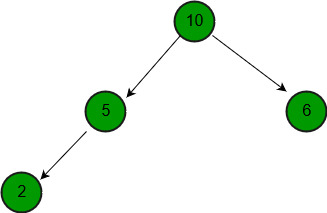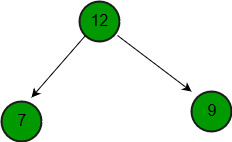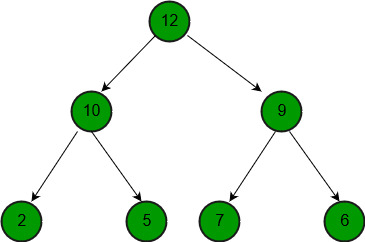Merge two binary Max Heaps
Last Updated :
31 Oct, 2023
Given two binary max heaps as arrays, the task is to merge the given heaps.
Examples :
Input: a = {10, 5, 6, 2}, b = {12, 7, 9}
Output: {12, 10, 9, 2, 5, 7, 6}



Input: a = {2, 5, 1, 9, 12}, b = {3, 7, 4, 10}
Output: {12, 10, 7, 9, 5, 3, 1, 4, 2}
Approach:To solve the problem follow the below idea:
Create an array to store the result. Copy both given arrays one by one into result. Once all the elements have been copied, then call standard build heap to construct full merged max heap.
Follow the given steps to solve the problem:
- Create an array merged of size N+M
- Copy elements of both the arrays in the array merged
- Build Max-Heap of this array
- Print elements of the Max-Heap
Below is the implementation of the above approach:
C++
#include <bits/stdc++.h>
using namespace std;
void maxHeapify(int arr[], int N, int idx)
{
if (idx >= N)
return;
int l = 2 * idx + 1;
int r = 2 * idx + 2;
int max = idx;
if (l < N && arr[l] > arr[idx])
max = l;
if (r < N && arr[r] > arr[max])
max = r;
if (max != idx) {
swap(arr[max], arr[idx]);
maxHeapify(arr, N, max);
}
}
void buildMaxHeap(int arr[], int N)
{
for (int i = N / 2 - 1; i >= 0; i--)
maxHeapify(arr, N, i);
}
void mergeHeaps(int merged[], int a[], int b[], int N,
int M)
{
for (int i = 0; i < N; i++)
merged[i] = a[i];
for (int i = 0; i < M; i++)
merged[N + i] = b[i];
buildMaxHeap(merged, N + M);
}
int main()
{
int a[] = { 10, 5, 6, 2 };
int b[] = { 12, 7, 9 };
int N = sizeof(a) / sizeof(a[0]);
int M = sizeof(b) / sizeof(b[0]);
int merged[N + M];
mergeHeaps(merged, a, b, N, M);
for (int i = 0; i < N + M; i++)
cout << merged[i] << " ";
return 0;
}
|
C
#include <stdio.h>
void swap(int* a, int* b)
{
int tmp = *a;
*a = *b;
*b = tmp;
}
void maxHeapify(int arr[], int N, int idx)
{
if (idx >= N)
return;
int l = 2 * idx + 1;
int r = 2 * idx + 2;
int max = idx;
if (l < N && arr[l] > arr[idx])
max = l;
if (r < N && arr[r] > arr[max])
max = r;
if (max != idx) {
swap(&arr[max], &arr[idx]);
maxHeapify(arr, N, max);
}
}
void buildMaxHeap(int arr[], int N)
{
for (int i = N / 2 - 1; i >= 0; i--)
maxHeapify(arr, N, i);
}
void mergeHeaps(int merged[], int a[], int b[], int N,
int M)
{
for (int i = 0; i < N; i++)
merged[i] = a[i];
for (int i = 0; i < M; i++)
merged[N + i] = b[i];
buildMaxHeap(merged, N + M);
}
int main()
{
int a[] = { 10, 5, 6, 2 };
int b[] = { 12, 7, 9 };
int N = sizeof(a) / sizeof(a[0]);
int M = sizeof(b) / sizeof(b[0]);
int merged[N + M];
mergeHeaps(merged, a, b, N, M);
for (int i = 0; i < N + M; i++)
printf("%d ", merged[i]);
return 0;
}
|
Java
class GfG {
public static void maxHeapify(int[] arr, int N, int i)
{
if (i >= N) {
return;
}
int l = i * 2 + 1;
int r = i * 2 + 2;
int max;
if (l < N && arr[l] > arr[i]) {
max = l;
}
else
max = i;
if (r < N && arr[r] > arr[max]) {
max = r;
}
if (max != i) {
int temp = arr[max];
arr[max] = arr[i];
arr[i] = temp;
maxHeapify(arr, N, max);
}
}
public static void mergeHeaps(int[] arr, int[] a,
int[] b, int N, int M)
{
for (int i = 0; i < N; i++) {
arr[i] = a[i];
}
for (int i = 0; i < M; i++) {
arr[N + i] = b[i];
}
N = N + M;
for (int i = N / 2 - 1; i >= 0; i--) {
maxHeapify(arr, N, i);
}
}
public static void main(String[] args)
{
int[] a = { 10, 5, 6, 2 };
int[] b = { 12, 7, 9 };
int N = a.length;
int M = b.length;
int[] merged = new int[M + N];
mergeHeaps(merged, a, b, N, M);
for (int i = 0; i < M + N; i++)
System.out.print(merged[i] + " ");
System.out.println();
}
}
|
Python3
def MaxHeapify(arr, N, idx):
if idx >= N:
return
l = 2 * idx + 1
r = 2 * idx + 2
Max = 0
if l < N and arr[l] > arr[idx]:
Max = l
else:
Max = idx
if r < N and arr[r] > arr[Max]:
Max = r
if Max != idx:
arr[Max], arr[idx] = arr[idx], arr[Max]
MaxHeapify(arr, N, Max)
def buildMaxHeap(arr, N):
for i in range(int(N / 2) - 1, -1, -1):
MaxHeapify(arr, N, i)
def mergeHeaps(merged, a, b, N, M):
for i in range(N):
merged[i] = a[i]
for i in range(M):
merged[N + i] = b[i]
buildMaxHeap(merged, N + M)
if __name__ == '__main__':
a = [10, 5, 6, 2]
b = [12, 7, 9]
N = len(a)
M = len(b)
merged = [0] * (M + N)
mergeHeaps(merged, a, b, N, M)
for i in range(N + M):
print(merged[i], end=" ")
|
C#
using System;
class GfG {
public static void maxHeapify(int[] arr, int N, int i)
{
if (i >= N) {
return;
}
int l = i * 2 + 1;
int r = i * 2 + 2;
int max;
if (l < N && arr[l] > arr[i]) {
max = l;
}
else
max = i;
if (r < N && arr[r] > arr[max]) {
max = r;
}
if (max != i) {
int temp = arr[max];
arr[max] = arr[i];
arr[i] = temp;
maxHeapify(arr, N, max);
}
}
public static void mergeHeaps(int[] arr, int[] a,
int[] b, int N, int M)
{
for (int i = 0; i < N; i++) {
arr[i] = a[i];
}
for (int i = 0; i < M; i++) {
arr[n + i] = b[i];
}
N = N + M;
for (int i = N / 2 - 1; i >= 0; i--) {
maxHeapify(arr, N, i);
}
}
public static void Main()
{
int[] a = { 10, 5, 6, 2 };
int[] b = { 12, 7, 9 };
int N = a.Length;
int M = b.Length;
int[] merged = new int[M + N];
mergeHeaps(merged, a, b, N, M);
for (int i = 0; i < M + N; i++)
Console.Write(merged[i] + " ");
Console.WriteLine();
}
}
|
Javascript
function maxHeapify(arr , n , i)
{
if (i >= n) {
return;
}
var l = i * 2 + 1;
var r = i * 2 + 2;
var max;
if (l < n && arr[l] > arr[i]) {
max = l;
} else
max = i;
if (r < n && arr[r] > arr[max]) {
max = r;
}
if (max != i) {
var temp = arr[max];
arr[max] = arr[i];
arr[i] = temp;
maxHeapify(arr, n, max);
}
}
function mergeHeaps(arr, a, b , n , m) {
for (var i = 0; i < n; i++) {
arr[i] = a[i];
}
for (var i = 0; i < m; i++) {
arr[n + i] = b[i];
}
n = n + m;
for (var i = parseInt(n / 2 - 1); i >= 0; i--) {
maxHeapify(arr, n, i);
}
}
var a = [ 10, 5, 6, 2 ];
var b = [ 12, 7, 9 ];
var n = a.length;
var m = b.length;
var merged = Array(m + n).fill(0);
mergeHeaps(merged, a, b, n, m);
for (var i = 0; i < m + n; i++)
document.write(merged[i] + " ");
|
PHP
<?php
function maxHeapify(&$arr, $N, $i)
{
$largest = $i;
$l = 2*$i + 1;
$r = 2*$i + 2;
if ($l < $N && $arr[$l] > $arr[$largest])
$largest = $l;
if ($r < $N && $arr[$r] > $arr[$largest])
$largest = $r;
if ($largest != $i)
{
$swap = $arr[$i];
$arr[$i] = $arr[$largest];
$arr[$largest] = $swap;
maxHeapify($arr, $N, $largest);
}
}
function BuildMaxHeap(&$arr, $N)
{
for ($i = ($N / 2) - 1; $i >= 0; $i--)
maxHeapify($arr, $N, $i);
}
$arrA = array(10, 5, 6, 2);
$arrB = array(12, 7, 9);
$N = sizeof($arrA)/sizeof($arrA[0]);
$M = sizeof($arrB)/sizeof($arrB[0]);
$mergedArray = array();
for($i = 0; $i < $N; $i++)
array_push($mergedArray, $arrA[$i]);
for($i = 0; $i < $M; $i++)
array_push($mergedArray, $arrB[$i]);
BuildMaxHeap($mergedArray, $N + $M);
for ($i = 0; $i < $N + $M; ++$i)
echo ($mergedArray[$i]." ");
?>
|
Time Complexity: O(N + M)
Auxiliary Space: O(N + M)
Another Optimised Approach- Time Complexity: O(N + M) & Auxiliary Space: O(1)
Approach:
1. Initialize two indices, `i` and `j`, to track the current elements of arrays `a` and `b` respectively.
2. Use two boolean variables, `vis_next1` and `vis_next2`, to keep track of whether the next element of array `a` or `b` has been visited or not.
3. Iterate until either array `a` or array `b` is exhausted.
4. Compare current and the next elements of arrays `a` and `b` and select the maximum element among them.
5. Print the maximum element and update the indices and boolean variables accordingly.
6. If all elements of array `a` are processed, print the remaining elements of array `b`, and vice versa.
Below is the implementation of the above approach:
C++
#include <iostream>
using namespace std;
void mergeHeaps(int a[], int b[], int n, int m) {
bool vis_next1 = false, vis_next2 = false;
int i = 0, j = 0;
while (i != n && j != m) {
int max1 = i, max2 = j;
if (i + 1 != n && !vis_next1 && a[i + 1] > a[i])
max1 = i + 1;
if (j + 1 != m && !vis_next2 && b[j + 1] > b[j])
max2 = j + 1;
if (a[max1] > b[max2]) {
cout << a[max1] << " ";
if (max1 == i + 1)
vis_next1 = true;
else {
if (vis_next1) {
i += 2;
vis_next1 = false;
}
else
i++;
}
}
else {
cout << b[max2] << " ";
if (max2 == j + 1)
vis_next2 = true;
else {
if (vis_next2) {
j += 2;
vis_next2 = false;
}
else
j++;
}
}
}
if (i == n) {
while (j != m) {
cout << b[j] << " ";
j++;
if (vis_next2) {
vis_next2 = false;
j++;
}
}
}
else {
while (i != n) {
cout << a[i] << " ";
i++;
if (vis_next1) {
vis_next1 = false;
i++;
}
}
}
return;
}
int main() {
int a[] = { 10, 5, 6, 2 };
int b[] = { 12, 7, 9 };
int N = sizeof(a) / sizeof(a[0]);
int M = sizeof(b) / sizeof(b[0]);
mergeHeaps(a, b, N, M);
return 0;
}
|
Java
import java.io.*;
class GFG {
static void mergeHeaps(int a[], int b[], int n, int m) {
boolean vis_next1 = false, vis_next2 = false;
int i = 0, j = 0;
while (i != n && j != m) {
int max1 = i, max2 = j;
if (i + 1 != n && !vis_next1 && a[i + 1] > a[i])
max1 = i + 1;
if (j + 1 != m && !vis_next2 && b[j + 1] > b[j])
max2 = j + 1;
if (a[max1] > b[max2]) {
System.out.print(a[max1]+" ");
if (max1 == i + 1)
vis_next1 = true;
else {
if (vis_next1) {
i += 2;
vis_next1 = false;
}
else
i++;
}
}
else {
System.out.print(b[max2]+" ");
if (max2 == j + 1)
vis_next2 = true;
else {
if (vis_next2) {
j += 2;
vis_next2 = false;
}
else
j++;
}
}
}
if (i == n) {
while (j != m) {
System.out.print(b[j]+" ");
j++;
if (vis_next2) {
vis_next2 = false;
j++;
}
}
}
else {
while (i != n) {
System.out.print(a[i]+" ");
i++;
if (vis_next1) {
vis_next1 = false;
i++;
}
}
}
return;
}
public static void main (String[] args) {
int a[] = { 10, 5, 6, 2 };
int b[] = { 12, 7, 9 };
int N = a.length;
int M = b.length;
mergeHeaps(a, b, N, M);
}
}
|
Python3
def mergeHeaps(a, b, n, m):
vis_next1 = False
vis_next2 = False
i = 0
j = 0
while i != n and j != m:
max1 = i
max2 = j
if i + 1 != n and not vis_next1 and a[i + 1] > a[i]:
max1 = i + 1
if j + 1 != m and not vis_next2 and b[j + 1] > b[j]:
max2 = j + 1
if a[max1] > b[max2]:
print(a[max1], end=" ")
if max1 == i + 1:
vis_next1 = True
else:
if vis_next1:
i += 2
vis_next1 = False
else:
i += 1
else:
print(b[max2], end=" ")
if max2 == j + 1:
vis_next2 = True
else:
if vis_next2:
j += 2
vis_next2 = False
else:
j += 1
if i == n:
while j != m:
print(b[j], end=" ")
j += 1
if vis_next2:
vis_next2 = False
j += 1
else:
while i != n:
print(a[i], end=" ")
i += 1
if vis_next1:
vis_next1 = False
i += 1
if __name__ == "__main__":
a = [10, 5, 6, 2]
b = [12, 7, 9]
N = len(a)
M = len(b)
mergeHeaps(a, b, N, M)
|
C#
using System;
class Program
{
static void MergeHeaps(int[] a, int[] b, int n, int m)
{
bool visNext1 = false;
bool visNext2 = false;
int i = 0;
int j = 0;
while (i != n && j != m)
{
int max1 = i;
int max2 = j;
if (i + 1 != n && !visNext1 && a[i + 1] > a[i])
max1 = i + 1;
if (j + 1 != m && !visNext2 && b[j + 1] > b[j])
max2 = j + 1;
if (a[max1] > b[max2])
{
Console.Write(a[max1] + " ");
if (max1 == i + 1)
visNext1 = true;
else
{
if (visNext1)
{
i += 2;
visNext1 = false;
}
else
i++;
}
}
else
{
Console.Write(b[max2] + " ");
if (max2 == j + 1)
visNext2 = true;
else
{
if (visNext2)
{
j += 2;
visNext2 = false;
}
else
j++;
}
}
}
if (i == n)
{
while (j != m)
{
Console.Write(b[j] + " ");
j++;
if (visNext2)
{
visNext2 = false;
j++;
}
}
}
else
{
while (i != n)
{
Console.Write(a[i] + " ");
i++;
if (visNext1)
{
visNext1 = false;
i++;
}
}
}
}
static void Main()
{
int[] a = { 10, 5, 6, 2 };
int[] b = { 12, 7, 9 };
int n = a.Length;
int m = b.Length;
MergeHeaps(a, b, n, m);
}
}
|
Javascript
function mergeHeaps(a, b, n, m) {
let vis_next1 = false;
let vis_next2 = false;
let i = 0;
let j = 0;
while (i !== n && j !== m) {
let max1 = i;
let max2 = j;
if (i + 1 !== n && !vis_next1 && a[i + 1] > a[i])
max1 = i + 1;
if (j + 1 !== m && !vis_next2 && b[j + 1] > b[j])
max2 = j + 1;
if (a[max1] > b[max2]) {
console.log(a[max1] + " ");
if (max1 === i + 1)
vis_next1 = true;
else {
if (vis_next1) {
i += 2;
vis_next1 = false;
}
else
i++;
}
}
else {
console.log(b[max2] + " ");
if (max2 === j + 1)
vis_next2 = true;
else {
if (vis_next2) {
j += 2;
vis_next2 = false;
}
else
j++;
}
}
}
if (i === n) {
while (j !== m) {
console.log(b[j] + " ");
j++;
if (vis_next2) {
vis_next2 = false;
j++;
}
}
}
else {
while (i !== n) {
console.log(a[i] + " ");
i++;
if (vis_next1) {
vis_next1 = false;
i++;
}
}
}
}
const a = [10, 5, 6, 2];
const b = [12, 7, 9];
const N = a.length;
const M = b.length;
mergeHeaps(a, b, N, M);
|
Output
12 10 9 7 5 6 2
Time Complexity: O(N + M)
Auxiliary Space: O(1)
Share your thoughts in the comments
Please Login to comment...